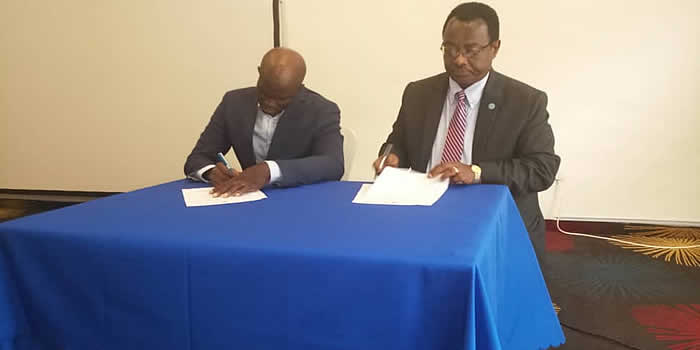Adverts
AGRICULTURE
ABNJ-Ghana Project transfers Electronic Monitoring System (EMS) to Fisheries Commission
The Deputy Minister if Fisheries and Aquaculture Development, Kingsley Ato Codjoe has given a strong indication that the country will incorporate the Electronic Monitoring System (EMS) in the new revised Fisheries laws as a tool to enhance compliance with national and international laws.

Date Created : 1/25/2019 5:45:12 AM : Story Author : Dominic Shirimori/Ghanadistricts.com
“We are currently in the process of reviewing our fisheries laws and the time to act is now”.
The Deputy Minister who was speaking at the closing ceremony of the pilot project on the Electronic Monitoring System of the FAO/ Areas Beyond National Jurisdiction (ABNJ) project assured that Ghana will continue the project for maintenance and its sustainability.
“The use of EMS as a tool for compliance will help inform management among others to curb practices such as illegal transshipment whist also boasting and maintaining the ecosystem with more knowledge and identification of endangered species.
We are poised to maintain the system and we believe we will take all the necessary steps in this regard”, he indicated.
The ABNJ project is introduced to help achieve responsible fishing practices by
• Supporting efficient and sustainable tuna production and biodiversity conservation in the ABNJ through systematic application of an ecosystem approach;
• Reducing illegal, unreported and unregulated fishing,
• Mitigating adverse impact of by-catch on biodiversity in the use of sustainable and efficient fisheries.
According to Mr Cudjoe, Ghana as a key fishing nation in the Atlantic Ocean exploiting tuna resources beyond her EEZ accepted in principle to be part of the pilot programme to be more transparent in monitoring her fishing activities at sea most specifically beyond areas of national jurisdiction.
He praised and attested to the fact that monitoring of fishing activities at sea with the development and development of Electronic Systems has so far been very effective in Ghana since its inception in 2015. He added; “The benefits have been of immense importance to the fishery in Ghana and has enhanced Monitoring, Control and Surveillance capability within the Fisheries Commission, and enhanced firm assurance and access of our products on the market”.
Mr. John A. Farmer, President of Ghana Tuna Association who hailed the ABNJ project said adherence to it brings about transparency in the fishing sector and helped Ghana out of the threat of ‘Yellow card’.
He assured of the association’s resolve to help support the project to ensure its sustainability so that the country will continue to have the green light to sell its tuna in the international market.
The Regional Representative for Africa for Food and Agriculture Organization, Mr. Abebe Haile Gabriel noted that the initiative supports countries to improve compliance with regional regulations and to deter illegal, unreported and unregulated fishing, “an objective to which the government of Ghana through the Ministry of Fisheries and Aquaculture Development has demonstrated commitment and leadership”.
Mr Abebe commended Ghana for being one of the first countries to incorporate innovative electronic systems into its Monitoring, Control and Surveillance of fishing vessels to verify their compliance with domestic, regional and international regulations through objective and verifiable data.
He pledged the commitment of FAO to continue to collaborate with government of Ghana in support of sustainable fisheries development, and urged the private sector to contribute resources to make the Electronic Monitoring System a permanent tool in the fight against Illegal, Unreported and Unregulated (IUU) fishing.


 facebook
facebook X (twitter)
X (twitter) Youtube
Youtube +233 593 831 280
+233 593 831 280 0800 430 430
0800 430 430 GPS: GE-231-4383
GPS: GE-231-4383 info@ghanadistricts.com
info@ghanadistricts.com Box GP1044, Accra, Ghana
Box GP1044, Accra, Ghana